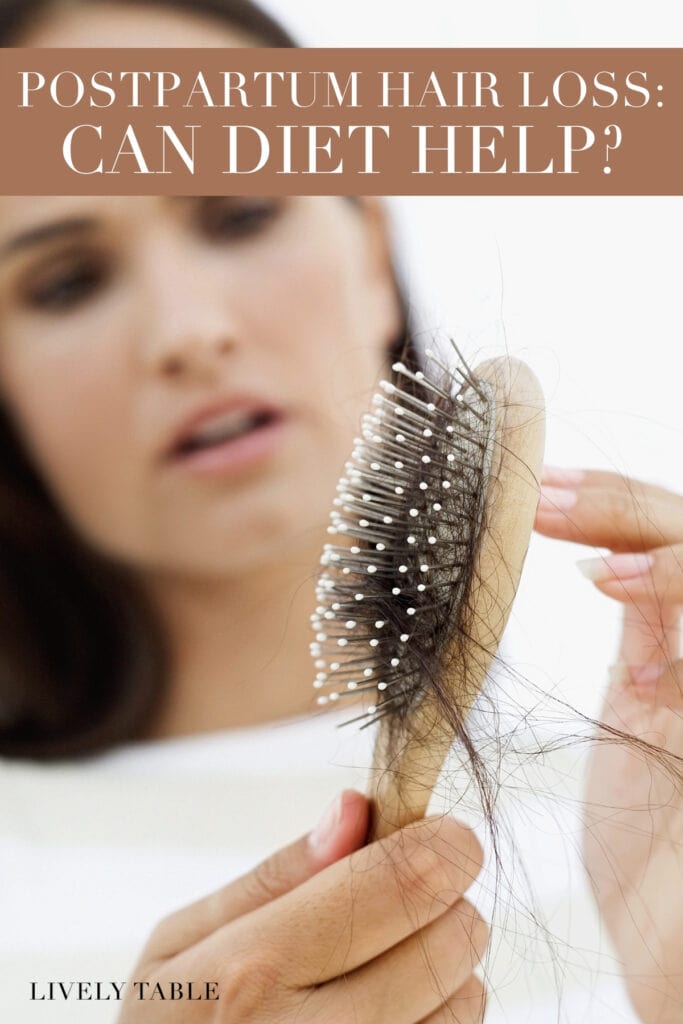Every new mom experiences it - the excessive (and slightly alarming!) shedding of hair postpartum. It can be surprising the first time you experience it. Here, I explain why your hair is falling out, and what, if anything, you can do about it.

The first time you pull out a large clump of your own hair roughly 3 months after giving birth, it's a little freaky. You may go running to Google to find out why this is happening, or maybe you're a seasoned mom and you knew it was coming. Either way, it's never a happy moment when the postpartum hair shedding begins.
Why Am I Losing So Much Hair Postpartum?
Just like everything pregnancy and baby related, hormones are to blame for the handful of hair you just pulled out. Everyone loses some hair on a daily basis. It's part of the normal hair growth cycle. Usually, each hair is on a little different time line, so you don't really notice the shedding of old hairs. During pregnancy, the surge in hormones causes the hairs that would normally fall out to stay in place (that's why your mane is gloriously thick during pregnancy!). Once you give birth and your hormone levels start to return to normal, all of those hairs that didn't fall out during pregnancy shed at once, usually around 2-5 months postpartum. Rest assured, it is normal. If you want to get more in depth, Lily Nichols does a great job explaining the whole process.
Will It Grow Back?
Don't worry, you will not be bald forever. Like I mentioned above, the hair shedding is normal, and YES it will grow back. According the American Academy of Dermatology, your hair should return to it's normal thickness by your new babe's first birthday.
Can I Make It Stop?
Unfortunately, no. There's not much you can do to prevent postpartum hair loss since it's all just part of the hormonal process. I suggest focusing your efforts on helping new hair grow back healthier. (A shorter haircut doesn't hurt either.)
How To Help Healthy Hair Growth With Diet
While there are probably many products out there claiming to magically give you thick, full hair, or maybe even prevent postpartum hair loss (they're lying), your best bet is to eat a balanced, nutritious diet for optimal hair growth. Which is actually good for you and baby postpartum, too!
- Protein. Hair is largely made up of keratin, a protein. So make sure you're getting plenty in the form of meat, poultry, eggs, fish, and dairy.
- B-Vitamins. B-Vitamins, especially Biotin, are important for hair growth. A deficiency in biotin has been linked to hair loss. B-Vitamins are mainly found in animal foods, as well as almonds, dark leafy greens and whole grains.
- Healthy Fats. Healthy fats help to keep your scalp and hair strands hydrated, and it helps with the absorption of several fat soluble nutrients that are key for hair health (like vitamins A, C, E and D). Get healthy fats from nuts, fatty fish, avocados and olive oil.
- Iron. Iron deficiency is a common cause of hair loss. You may already be taking an iron supplement postpartum. Iron is naturally present in red meat, eggs, oysters, spinach and lentils.
- Zinc. Zinc is another mineral whose deficiency is linked to hair loss. Like iron, you can get zinc from red meat, oysters, spinach and lentils.
- Vitamin C. Vitamin C is important for the production of collagen, a protein that is part of your hairs' structure. Vitamin C is easily found in many fruits and vegetables, like strawberries, bell pepper, citrus fruit, and kiwi.
- Vitamin E. Vitamin E acts as an antioxidant to protect hair from oxidative damage. Find it in nuts and seeds, avocados, and plant oils.
What About Supplements?
I always recommend getting nutrients from food when you can. As a general rule, I recommend continuing your prenatal vitamin or switching to a postnatal (I really like New Chapter) for the duration of breastfeeding, or at least 6 months to fill in any gaps, especially since your needs are higher. If you don't eat a lot of protein or get a lot of biotin (such as with a vegan diet) you may consider a hair, skin and nails supplement, too. Other than that, I wouldn't recommend supplementing with individual ingredients as getting too much of some nutrients (like zinc, vitamin, A and vitamin E) can actually worsen hair loss.
If you found this article helpful, please share with a mama friend!


Leave a Reply